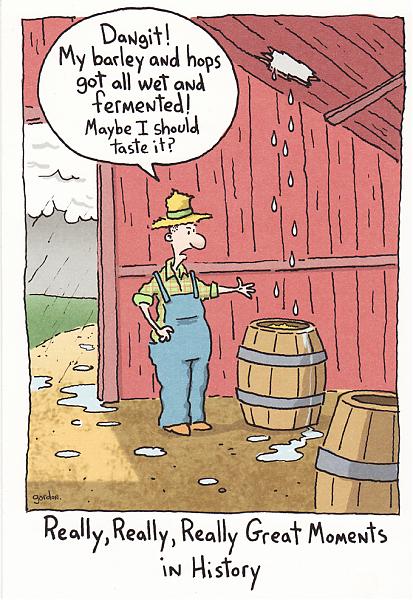I think that the progression of taste has changed quite a bit in the last few hundred years. Back then, you wouldn't find most of what we eat in America (even the ethnic foods) because the taste combinations or methods for making such food weren't practiced or experimented with as much. The ingredients were raw, whole, and more simple. This goes for their drinks as well. Did they make an oatmeal stout or a cherry wheat ale back then? Most likely not, but what they did make tasted great to them (and I'm sure a lot of us) and was a heck of a lot safer than untreated water.
Different times call for different measures.
But brewing actually took the opposite track in America, and most of the world...Beer started off pretty "complex" and "flavorful" when it was "food" but times changed for beer as well.....
America like most of the world had quite an extensive array of beers available prior to the German Invasion of brewer's which
later introduced the light lager. They pretty much had the "brewing culture" of all the countries that people immigrated from...Most English beer styles..you know Porters, Stouts, Partigyles, stuff like that. As well as mostly heavy German Styles of beer. Not to mention people from Scotland, Ireland, Russia and other places where beer was drank.
Remember up until then,
beer was food.
In fact thew whole history of the light lager is the American
populace's (not the brewer's) desire to have a lighter beer to drink, which forced the German brewers to look at adding adjuncts like corn and rice...not as the popular homebrewer's myth has been to make money by peddling and "inferior commercial product" by adding adjuncts,
but in order to come up with a style of beer that the American people wanted.
Maureen Ogle proved that in
Ambitious Brew it actually made the cost of a bottle of Budweiser cost around 17.00/bottle in today's dollars.
When AH released Budweiser with it's corn and rice adjuncts in the 1860's it was the most expensive beer out there; a single bottle retailed for $1.00 (what would equal in today's Dollars for $17.00) this was quite difference when a schooner of beer usually cost a nickel.
The American populace ate it up!
It wasn't done to save money, it was done because heavy beers (both english style Ales and the heavier Bavarian malty beers) were not being drunk by American consumers any more. Beer initally was seen around the world as food (some even called it liquid bread), but since America, even in the 1800's was a prosperous nation compared to the rest of the world, and americans ate meat with nearly every meal, heavy beers had fallen out of favor...
And American Barley just made for heavy, hazy beer
Bush and other German Brewers started looking at other styles of Beers, and came upon Karl Balling and Anton Schwartz's work at the Prague Polytechnic Institute with the Brewers in Bohemia who when faced with a grain shortage started using adjuncts, which produced the pils which was light, sparkly and fruity tasting...just the thing for American tastebuds.
So the brewers brought Schwartz to America where he went to work for American Brewer Magazine writing articles and technical monographs, teaching American brewers how to use Rice and Corn...
The sad moral of the story is....The big corporate brewers did not foist tasteless adjunct laced fizzy water on us, like the popular mythology all of us beersnobs like to take to bed with us to feel all warm and elitist....it was done because our American ancestors wanted it.
Listen to this from Basic Brewing;
November 30, 2006 - Ambitious Brew Part One
We learn about the history of beer in the USA from Maureen Ogle, author of "Ambitious Brew - The Story of American Beer." Part one takes us from the Pilgrims to Prohibition.
http://media.libsyn.com/media/basicbrewing/bbr11-30-06.mp3
December 7, 2006 - Ambitious Brew Part Two
We continue our discussion about the history of beer in the USA with Maureen Ogle, author of "Ambitious Brew - The Story of American Beer." Part two takes us from Prohibition to the present day.
http://media.libsyn.com/media/basicbrewing/bbr12-07-06.mp3
In fact Ogle talks about how the whole "lite beer" idea rose in the 50's to get the attention of stay at home wives who listened to the radio, would be the ones who would purchase the beer...
An intersting way to see how beer was looked at in Modernt times is through the ads...I posted a thread of some of them a couple years ago...
https://www.homebrewtalk.com/f5/more-vintage-beer-ads-72778/



